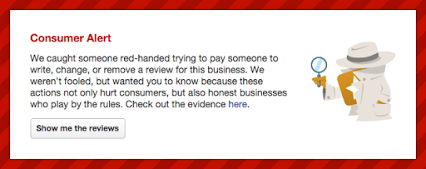Reviews and testimonials are powerful social proof of your business’s capabilities but they are often hard to get. Incentives, including contests and discount coupons as well as direct rewards, often will increase your review counts. But at what cost?
Should You Incentivize The Process to “Grease The Skids” and Facilitate Getting More Reviews?
The major review sites all take slightly different approaches but all make it clear that incentivized reviews are against their guidelines. Yelp for example explicitly prohibits any review soliciting which of course includes incentivized ones. And while not in their guidelines, will publicly shame a business that it discovers incentivizing reviews.
Google, while not prohibiting review requests, makes clear that incentives are against guidelines: Don’t offer or accept money, products, or services to write reviews for a business or to write negative reviews about a competitor.
TripAdvisor which actively encourages review solicitation, not only explicitly prohibits incentives but warns of manual penalties including the dreaded red badge: Penalties will be given to properties that offer incentives to their guests for writing reviews. In all cases, reviews in question will be removed. Further penalties are given on a case-by-case basis and range from a warning to a red badge added to your property listing. The red badge warns prospective guests that a property has not adhered to TripAdvisor policy. It also significantly impacts the property’s popularity ranking.
Truth in Advertising Guidelines
But the companies that gather and show reviews are not the only enforcers in town and perhaps not even the more critical ones. The FTC (Federal Trade Commission), most all states as well as Canada, Australia and Britain have Truth in Advertising guidelines that apply to the question of whether incentives are acceptable and all of them address the question of incentives. They do so with a uniform voice: If a review or testimonial is in any way incentivized, it must so note or be in violation of truth in advertising laws.
Below is the relevant guideline from the FTC. The short story? Asking for reviews is ok, incentives are not unless they are made explicit:
My company wants to contact customers and interview them about their experiences with our service. If we like what they say about our service, can we ask them to allow us to quote them in our ads? Can we pay them for letting us use their endorsements?
Yes, you can ask your customers about their experiences with your product and feature their comments in your ads. If they have no reason to expect compensation or any other benefit before they give their comments, there’s no need to disclose your payments to them.
However, if you’ve given these customers a reason to expect a benefit from providing their thoughts about your product, you should disclose that fact in your ads. For example, if customers are told in advance that their comments might be used in advertising, they might expect to receive a payment for a positive review, and that could influence what they say, even if you tell them that you want their honest opinion. In fact, even if you tell your customers that you aren’t going to pay them but that they might be featured in your advertising, that opportunity might be seen as having a value, so the fact that they knew this when they gave the review should be disclosed (e.g., “Customers were told in advance they might be featured in an ad.”).
I’m starting a new Internet business. I don’t have any money for advertising, so I need publicity. Can I tell people that if they say good things about my business in online reviews, I’ll give them a discount on items they buy through my website?
It’s not a good idea. Endorsements must reflect the honest opinions or experiences of the endorser, and your plan could cause people to make up positive reviews even if they’ve never done business with you. However, it’s okay to invite people to post reviews of your business after they’ve actually used your products or services. If you’re offering them something of value in return for these reviews, tell them in advance that they should disclose what they received from you. You should also inform potential reviewers that the discount will be conditioned upon their making the disclosure. That way, other consumers can decide how much stock to put in those reviews.
The FTC says that you can solicit reviews and incentivize them but ONLY if the reviewers disclose the fact. The review companies all say incentivized reviews will be taken down. You as the business are caught in a bind in which compliance is almost impossible.
Review abuses have recently taken on a much higher profile in the news. Every major English speaking country and several states have enforced and penalized abuses of the review guidelines.
Attorney General Steps In
Recently in New York for example the Attorney General handed out fines to companies for infractions as minor as giving out future discount coupons in return for reviews regardless of their sentiment. In speaking with one of the businesses that had been fined for giving out $10 coupons, the cost of fighting the charge would have far exceeded the $10,000 fine so he settled. At the national level the FTC had a very public settlementwith a car transport company that made their lowest price contingent upon leaving a review.
Given consumer reliance on reviews and the increasing scrutiny that reviews are coming under, it seems likely that we will see increased enforcement in the coming months.
In the end are review incentives worth it? With the growing use of reviews by consumers and the ever increasing number of news articles about deception in the review world both the review sites and government will feel the growing pressure to crack down on fake reviews in general and review incentives specifically.
Review Incentive Forecast: Cloudy to Stormy
Call me crazy but now is probably not the best time to be using incentives for your review program. While the benefits initially could bring you results, the direct and indirect costs of offering incentives could be far more than you ever anticipated.



